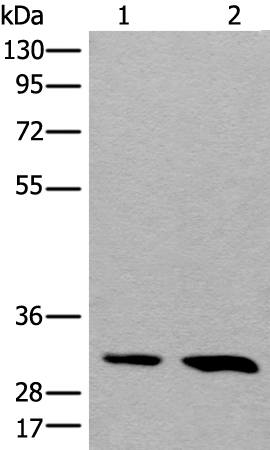
| WB | 咨询技术 | Human,Mouse,Rat |
| IF | 咨询技术 | Human,Mouse,Rat |
| IHC | 1/30-1/150 | Human,Mouse,Rat |
| ICC | 技术咨询 | Human,Mouse,Rat |
| FCM | 咨询技术 | Human,Mouse,Rat |
| Elisa | 1/5000-1/10000 | Human,Mouse,Rat |
| Aliases | HOX4; HOX4E; HOX5.4 |
| WB Predicted band size | 32 kDa |
| Host/Isotype | Rabbit IgG |
| Antibody Type | Primary antibody |
| Storage | Store at 4°C short term. Aliquot and store at -20°C long term. Avoid freeze/thaw cycles. |
| Species Reactivity | Human, Mouse |
| Immunogen | Synthetic peptide of human HOXD8 |
| Formulation | Purified antibody in PBS with 0.05% sodium azide and 50% glycerol. |
+ +
以下是关于F13B抗体的3篇代表性文献概览:
1. **文献名称**:*Autoantibodies against coagulation factor XIII B subunit in autoimmune diseases*
**作者**:Ichinose A, et al.
**摘要**:研究揭示了FXIII B亚基(F13B)抗体在系统性红斑狼疮(SLE)和类风湿关节炎患者中的存在,发现其与凝血功能异常相关,为自身免疫性疾病诊断提供了新标志物。
2. **文献名称**:*Development of monoclonal antibodies specific for human factor XIII B subunit*
**作者**:Muszbek L, et al.
**摘要**:团队成功制备了针对人F13B亚基的单克隆抗体,验证了其高特异性,并应用于ELISA检测和免疫组化,推进了FXIII蛋白复合物的病理机制研究。
3. **文献名称**:*Factor XIII B subunit polymorphisms and antibody-mediated thrombosis risk*
**作者**:Katona É, et al.
**摘要**:探讨了F13B基因多态性与抗磷脂抗体综合征患者血栓形成的关联,发现特定抗体可能通过干扰FXIII复合物功能增加血栓风险,为靶向治疗提供依据。
---
**说明**:F13B抗体研究主要集中在凝血异常疾病(如自身免疫病、血栓)的诊断标志物开发及病理机制探索领域。若需特定研究方向的扩展文献或全文链接,可进一步补充说明。
The F13B antibody targets the beta subunit of coagulation Factor XIII (FXIII), a key zymogen in hemostasis and wound healing. FXIII circulates as a heterotetramer (A2B2) in plasma, where the catalytic A subunits (synthesized in hematopoietic cells) are non-covalently bound to carrier B subunits (produced in hepatocytes). During clot formation, thrombin activates FXIII to FXIIIa, which cross-links fibrin strands to stabilize blood clots and enhance tissue repair.
F13B antibodies are primarily used in diagnostic and research settings to quantify or detect FXIII-B levels. Deficiencies in FXIII, though rare, can cause life-threatening bleeding disorders. Acquired FXIII deficiency may occur through autoimmune antibodies against either subunit, with anti-F13B antibodies being less common than anti-F13A. These autoantibodies are associated with conditions like lupus or lymphoproliferative disorders.
In clinical diagnostics, F13B-specific antibodies enable ELISA-based assays to distinguish subunit-specific deficiencies or monitor FXIII replacement therapy. Researchers also utilize them to study FXIII biology, including subunit interactions and regulatory mechanisms. Recent studies explore their role in non-hemostatic processes, such as angiogenesis and extracellular matrix remodeling. Commercial F13B antibodies are typically monoclonal, validated for applications like immunoblotting and immunohistochemistry.
×